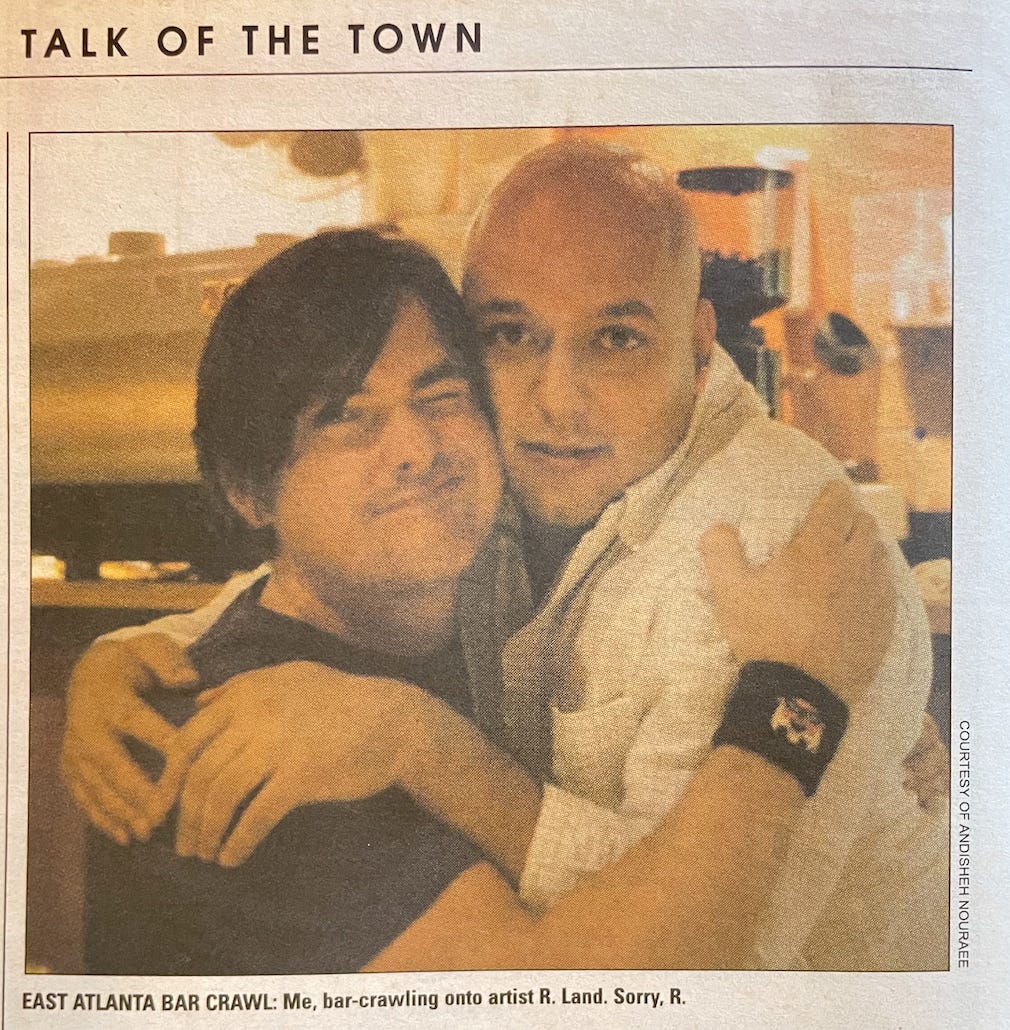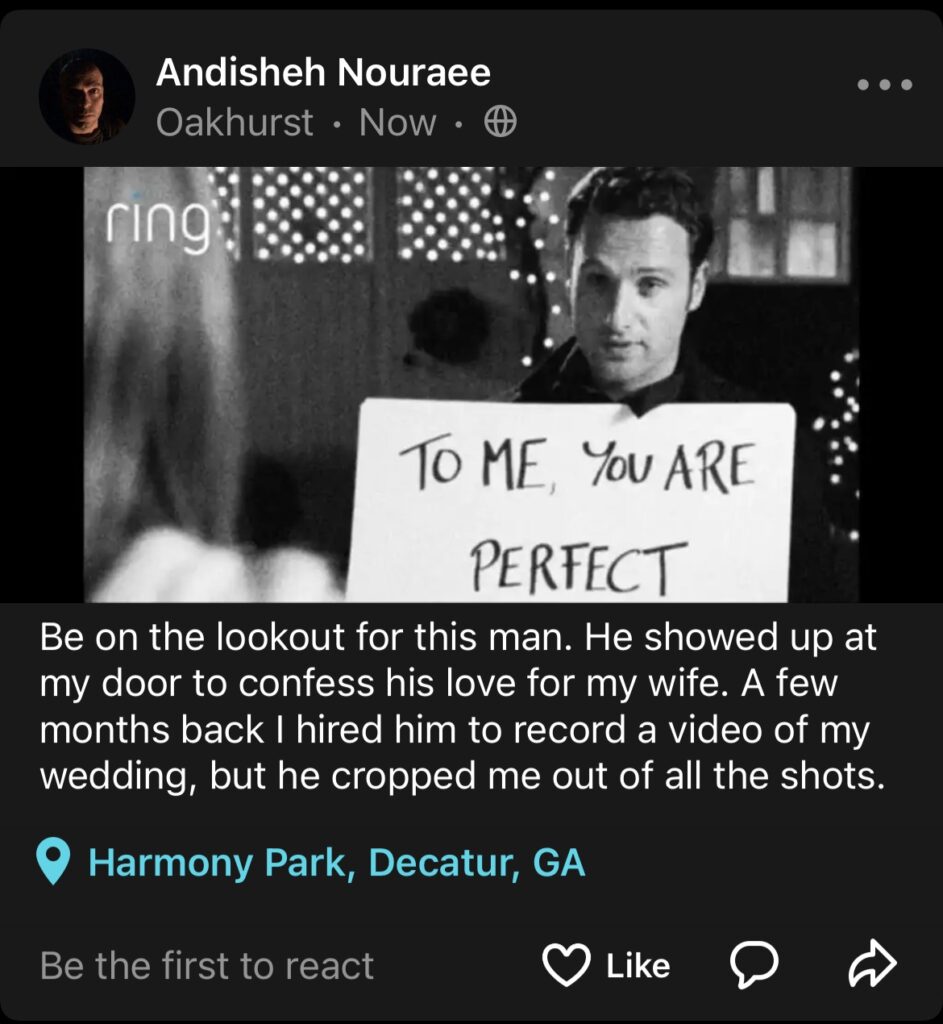
Category: Words
-
Big Dugnutt Energy
I visited Ashley Furniture today and noticed the names they give to their couches, chairs and tables sound like they came from the people who named the players in the video game Fighting Baseball – very similar to real names, but joyously just short of the mark.
Compare.
Fighting Baseball:

Here’s Ashley Furniture, which I compiled into a video.
-
Godless tornadoes
The other day I was next to one of Decatur, Georgia’s outdoor warning sirens when it delivered its monthly test wail. I’ve heard it many times before (approximately monthly, in fact) but I’d never been so close to it while it was going off.
It’s very loud. So loud that for a minute I stopped what I was doing and thought about them.
Grosvenor Elementary School in Bethesda, Maryland, where I went to kindergarten, had such a siren in its parking lot. It wasn’t a tornado siren though. It was an air raid siren. That’s what all of those sirens are.
My elementary school years were mid-late Cold War, and we were an ICBM’s throw from the U.S. Capitol, White House and Pentagon. So we had drills. Not duck-and-cover. More like a mellow fire drill, but the fire was Marxism-Leninism.
I recall when the siren was tested we’d gather and sit criss-cross applesauce*. I imagine many of us plugged our ears. I plugged mine the other day. Those things are loud.
My kids don’t know them as air raid sirens. We call them tornado sirens. Our town’s sirens, and probably your town’s sirens, are maintained via a grant from the federal government. The alarm hardware we built for the Cold War turned out to be more durable than the Soviet Union though. Rather than tear the sirens down and turning them into freedom funnels, we kept them and rebranded them. As tornado sirens.
The idea that tornadoes and Communists are co-equal threats to the American Way of Life isn’t recent. It was part of the popular discourse as early as 1979, coincidentally the year I was in kindergarten.
In an episode of the WKRP in Cincinnati, a sitcom about a struggling radio station, the hapless-but-self-serious news reporter Les Nessman panics because he doesn’t have a contingency plan for going on-air to talk about tornadoes. He does however, have a script for a Soviet invasion. At the station manager’s suggestion, Les repurposes his Soviet-invasion contingency plan for the tornado.
10 or so years later, hundreds of American municipalities pulled a Les Nessman, repurposing our nation’s air raid sirens to defend us against Communism’s windy cousin.
(*For those who haven’t been around kids since being casually racist in schools started going out of fashion, it’s the sitting Style Formerly Known as Indian.)
-
Whoomp, it is everywhere
Whoomp, there it is. Uf, ahí está. Ouf, ça y est. Puh, da ist es. Boh, eccolo. Угу, вот оно. Uff, oto jest. Hoppsan, där är den. Whoomp, ibi est. Uau, iată. Уф, еве го. Ουφ, ορίστε. Whoomp, tá sé. Aupa, hor dago. Whoomp, na de i de. 우와, 저기 있네. 哎呀,就是这样。Whoomp, hiyo hapo. ، یہ وہاں ہے. Woomp. Kai, akwai shi. Whoop, itu dia. おっと、そこです。وهاووومب ، ها هو. İşte burada. Hum, jen ĝi. Yaitu Begitu.
-
WQXI Solid Gold Atlanta time capsule
I found this in my in-laws’ basement. It’s a 2-LP, genre-agnostic compilation released by WQXI 790AM radio (still on-air today as Atlanta Radio Korea). It used to be sports talk and way before that it was a hugely popular top 40 that put out compilation LPs. No year is printed on it, but the songs on it I know suggest to me it’s 1970 or so.

It’s a fun time capsule: of the Atlanta skyline, old top 40 radio’s catholic approach to playlists, hair cuts, white supremacy, and the city’s media culture.
Unlike 2022’s iconic Downtown view (typically taken from the east – think Walking Dead), this 1970 view is taken from the south (think driving to Downtown from the airport). The image appears to be taken from the air, just across the highway from Georgia State stadium (formerly Turner Field).
The back cover shows Atlanta Stadium (later called Atlanta-Fulton County Stadium, now the apartments and parking next to Georgia State stadium). Tasked with finding an image for this LP that screamed “Atlanta” to 1970 record-buying Atlantans, it’s interesting they went with a stadium. It was a bigger deal to have a pro sports stadium then.
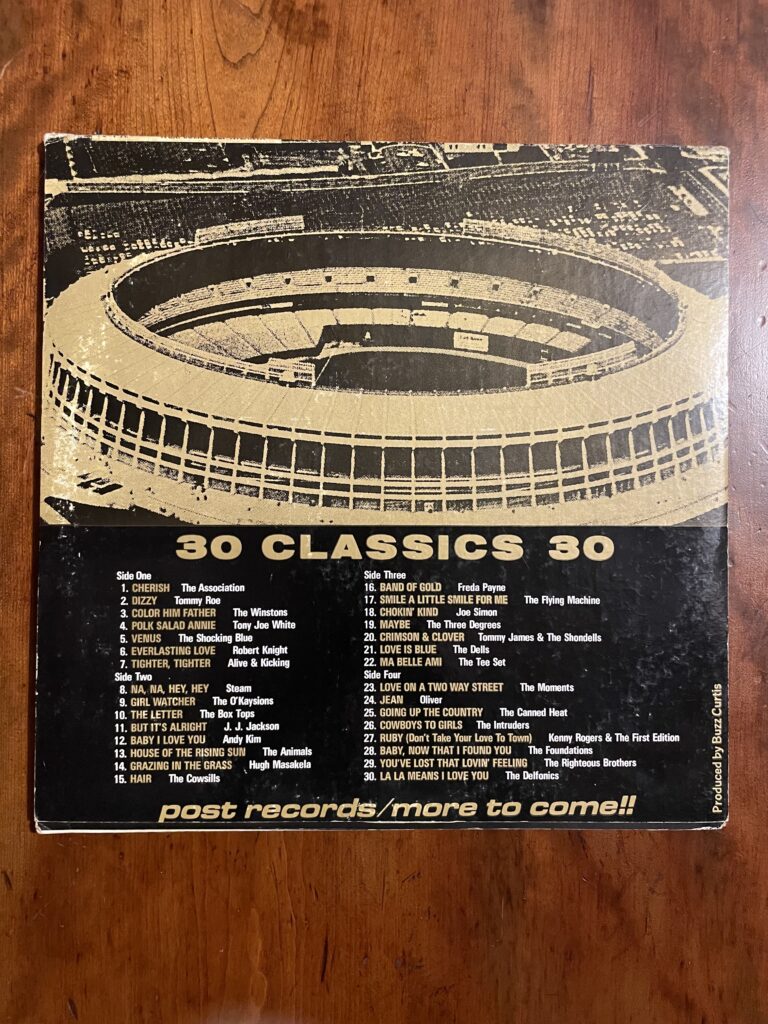
Inside the gatefold is a yearbook of the station’s DJs, and a collage of snapshots that includes photos of Tiny Tim and Donovan. I assume they’re from station promo visits. The Donovan station visit might have been to promote his October 1969 concert in Atlanta. Donovan was also promoting, though maybe not intentionally, the popularity of the name girl name Jennifer. One of his hits at the time was “Jennifer Juniper”. Jennifer began its 15 year reign as the most popular baby girl name in Georgia the year after Donovan’s visit. If you’re a Georgia Gen-Xer named Jennifer, this LP sleeves offers you a faint whiff of the soil from which our bumper crop of Gen-X Jennifers grew.
I don’t recognize any of the DJs, all of whom appear to be white except for maybe George Strait (it’s hard to tell in the sketch, and no he’s not that George Strait). The station played black artists. It just didn’t appear to employ very many black people.
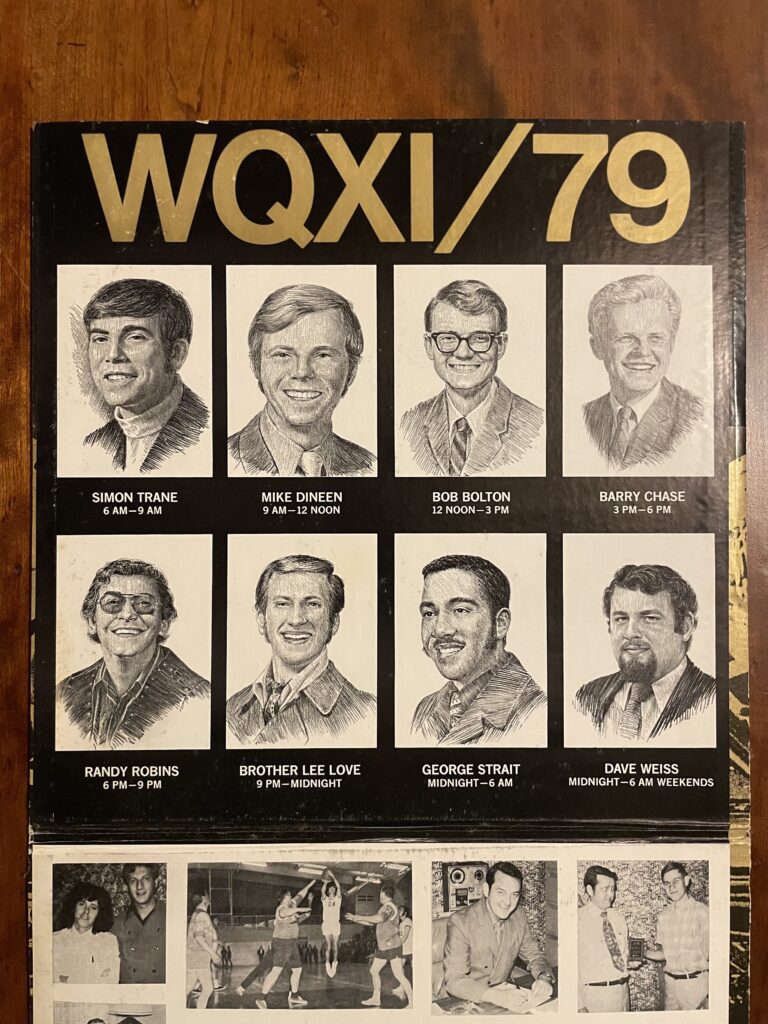
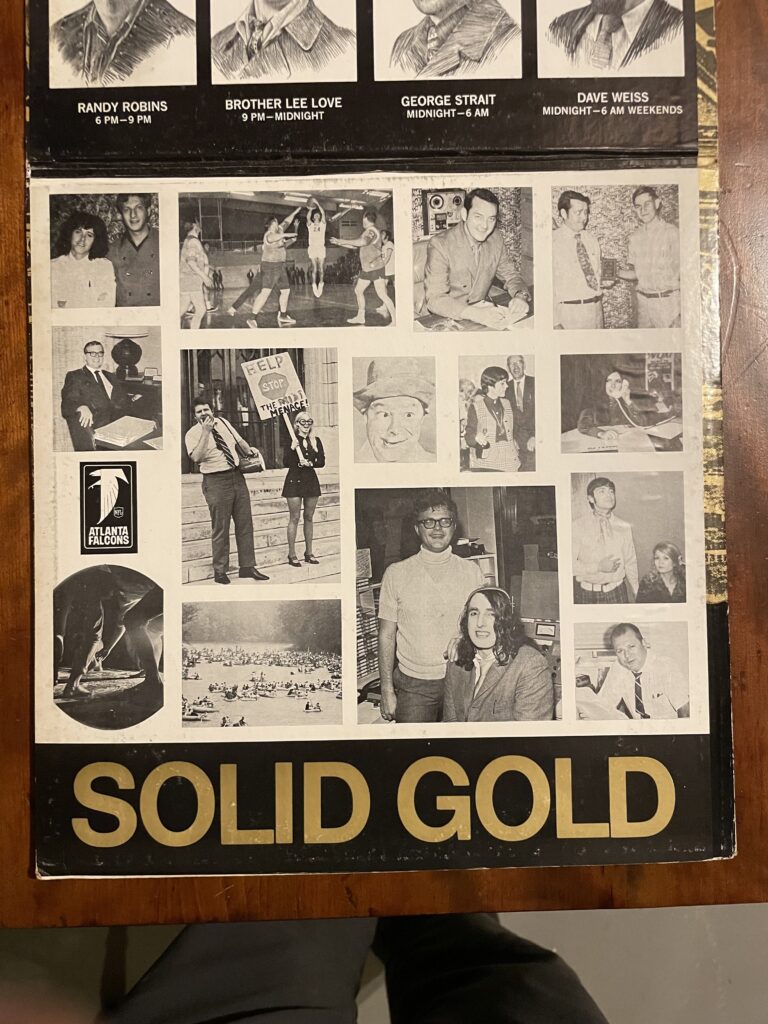
Despite the station’s seeming willingness to play anything that was a hit, few of the songs here ended up being top tier oldies radio staples. “You’ve Lost That Loving Feeling” is the biggest song here by far, and Kenny Rogers is the only artist here who became/remained a big star. “The Letter” was sung by Alex Chilton, who later was in Big Star, but was never a big star.
WQXI is said to have been the inspiration for the WKRP In Cincinnati. Perhaps the helicopter they took the photos from is the one they dropped the turkeys from.
-
Who is Viktor Bout?
The U.S. just got WNBA player Brittney Griner out of a Russian prison by trading imprisoned (in the U.S.) international arms dealer Viktor Bout. Bout has run guns for some of your favorite armies, including for the U.S. I wrote about him in 2007.
From August 2007:
Who is Victor Bout?
For several months, the White House and Pentagon have been telling the American public Iran is responsible for the deaths of hundreds of American troops in Iraq.
According to the U.S. government, media reports and two Iraq war veterans I’ve spoken to, militants in Iraq frequently attack American vehicles with Iranian-made explosives specially formed to penetrate armor.
Asked earlier this year whether he thought the Iranian government was responsible for sending the weapons to Iraq, President Bush offered this sarcastic reply: “What’s worse? That the government knew — or that the government didn’t know?”
Aww, snap!
How will the Iranian Ministry of Snappy Comebacks ever top that?
Turns out it doesn’t need to.
Last month, the U.S. Government Accountability Office reported the Pentagon lost 30 percent of the weapons it sent to Iraq between 2004 and 2007.
That’s 80,000 pistols and 110,000 AK-47 rifles purchased for Iraq’s military and police services gone missing.
What happened to these weapons? If the Pentagon knows, it isn’t saying.
They may be sitting in a warehouse somewhere. They may be in crates with checkered table cloths on top being used as dinner tables.
Or they may be in the hands of Iraqi insurgents and militia fighters, the people sending American soldiers and Marines home on stretchers and in coffins.
And the worst part: The Pentagon should have known its methods of funneling resources into Iraq were so insecure that a major security breach, such as 190,000 guns going missing, was inevitable.
The military doesn’t have enough transport capacity to move people, arms, equipment, food and fuel around on its own. It relies on private shippers. Among them is a man named Victor Bout (pronounced boot), thought to be one of the world’s pre-eminent black-market weapons merchants.
Born in Tajikistan of Russian parents, Bout came to prominence in the late 1990s for arming brutal civil wars in Liberia, Sierra Leone and Angola — the wars that introduced the phrase “blood diamond” into our vocabularies. He reportedly owns a large fleet of cargo aircraft and has a reputation for being able to get large amounts of almost every weapon imaginable to the remotest of locations. The United Nations and Human Rights Watch have been complaining about him for nearly a decade. A guest on an Aug. 4, 2001, CNN program called him “a kingpin in the illegal small-arms trade.”
For a while in the 1990s, Bout armed the anti-Taliban forces of the Northern Alliance in Afghanistan. Then, in 1995, one of his planes was reportedly captured by Taliban forces.
What some people might have considered a problem, Bout’s organization considered an opportunity. Western intelligence agencies believe Bout used his group’s encounter with the Taliban to make an arms deal. He switched sides and reportedly sold some $50 million of weapons to the Taliban in the late 1990s and early 2000s. In other words, Bout was arming the people who sheltered the terrorists who executed 9/11.
After 9/11, the U.S. government went after Bout. The Treasury Department tried to shut him down by going after his money.
Apparently the Pentagon didn’t get the memo.
Pentagon contractors hired Bout’s planes to move equipment in and out of Baghdad. Among the cargo Bout’s planes were supposed to have shipped: guns for Iraqi military and police.
In other words, the Pentagon paid a well-known double-dealer who sold tanks and guns to the Taliban to fly weapons into Iraq — at the same time the Treasury Department was trying to shut him down.
How many of the missing 190,000 guns were shipped by Bout is unclear. What’s clear, however, is that the missing 190K is just the tip of an iceberg.
Washington Post reporter Douglas Farah and L.A. Times reporter Stephen Braun have just co-authored a book about Bout that claims the United States paid him to ship 200,000 AK-47s to Iraq from Bosnia in 1994. The GAO and Pentagon have no clue where those weapons are now.
Braun and Farah’s book is titled, appropriately, Merchant of Death.
-
Brian Kemp threatened to withhold COVID supplies from Georgia hospitals because one of my Tweets showed the world how stupid he is.
In April 2020, Georgia’s Republican Gov. Brian Kemp threatened to withhold lifesaving emergency COVID-19 support from a large Atlanta hospital system because one of my Tweets showed the world how murderously stupid he is.
Here’s a screenshot of the Tweet, and a YouTube link to the video included in the Tweet.
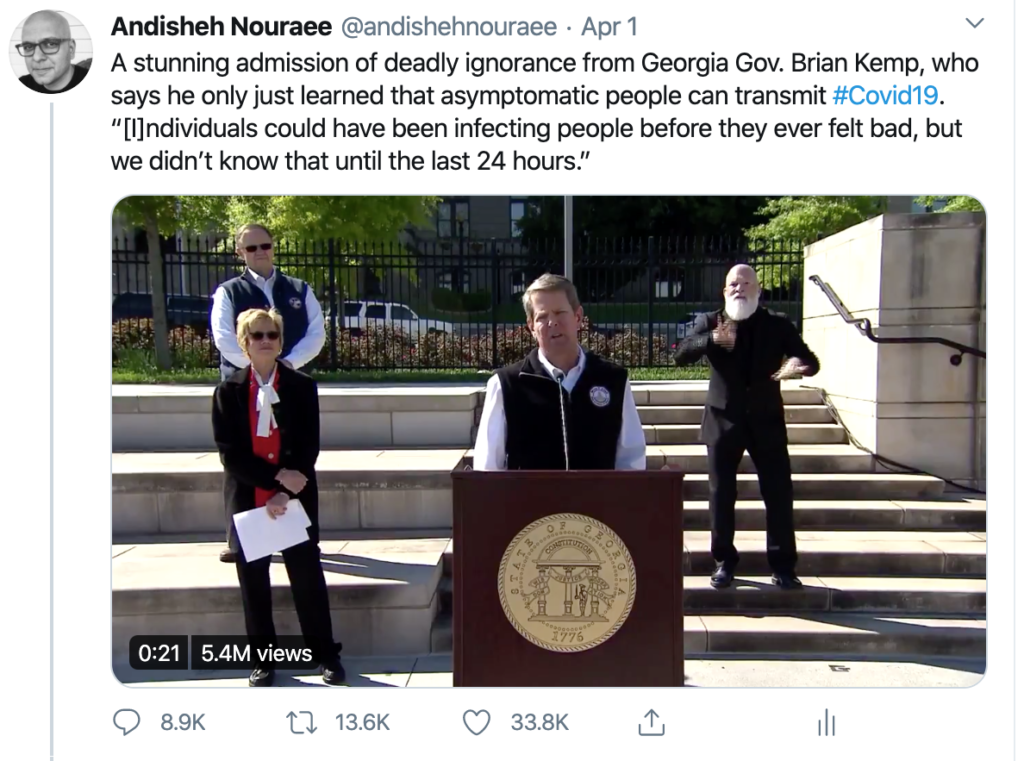
That people can spread COVID-19 without symptoms was published and widely reported more than 8 weeks before Kemp idiotically presented it as a “game changer” at a press conference.
Videos go viral because they’re surprising or shocking. This was both. The man in charge of a public health response for 10 million people proudly announced to the world that he’s murderously incompetent. It’s as if a fire chief went on TV to say “I just learned that gasoline is flammable and have asked the fire department to stop spraying it on houses. Game changer, y’all.”
Instead of apologizing or promising to try harder not to kill Georgians, Kemp’s office responded to his Internet infamy in the style of petty tyrants everywhere – he attacked the messenger. Specifically, he threatened me and my employer.
Why should you care? Because my employer at the time was Emory University, which operates the largest hospital system in Georgia.
On the morning of April 3, 2020, 36 hours after my Tweet, a senior Emory executive called me. She explained that the governor’s office had contacted her and told her my tweet jeopardized Emory’s cooperative relationship with the state. In case I didn’t quite understand the subtleties of the “Nice hospital you got there. Shame if anything happened to it,” mafia threat she’d just received, she spelled it out for me. She said she thought my Tweet could complicate Emory’s efforts to get desperately needed masks, gloves, PPE and ventilators for its hospitals. If I kept my Tweet up, Kemp’s office was threatening retaliation that would risk the lives of healthcare workers and patients. Deleting my Tweet, she reasoned, would reduce that deadly risk, or so one of Kemp’s goons implied to her.
So I deleted the tweet. The governor’s stupidity had already spent 24 hours on cable news repeat, so my duty as a concerned loudmouth citizen was done.
I was annoyed, and honestly more than a little rattled that the governor was behaving like a gangster. In the middle of a public health emergency would go on to kill nearly 40 times as many Georgians as died in World War II, Kemp and his staff were petty enough to go after me. How far would they go to make my life miserable?
Using the power of elected office to punish a private citizen for free speech is immoral (quaint, I know), a violation of his oath of office (also quaint these days), and also a criminal offense (assuming you live in a state where the attorney general isn’t a partisan hack). Calling executives at my office because I tweeted a video of Kemp’s speech on my personal Twitter account is the governor saying he wants my employer to punish me. They never reached out to me personally even though I’m easy to find.
I shared the threat at the time with a handful of people I trusted. And there was a third person on the call who heard it. I would have shared it publicly, but I calculated (I think correctly) that it was all risk for me and no chance of the Trump Justice Department or Georgia’s Trumpy Attorney General sticking up for the rule of law. Not my most principled or courageous moment, but unlike Kemp my decisions don’t kill people.
Why mention this 2.5 years after it happened? Because earlier today I read about yet another study quantifying how Republicans are the party of COVID death and it reminded me. Also, early voting starts in a week and Georgians deserve better than Brian Kemp.
-
Don’t Write Drunk
Loss Cat seems like it’s been part of intown Atlanta’s iconography forever, but before it became an icon, someone had to make it and other people had to start noticing it.
The someone who made it is artist R. Land. I first noticed Loss Cat 18 summers ago in East Atlanta. I wrote about in my Scene & Herd column from July 29, 2004. That column was an experiment of sorts — the event was a bar crawl and I decided to drink. A lot. Do the inhibition-lowering properties of alcohol make for cleverer or more incisive writing? I observed that the Loss Cat looks “sorta broken”. I think the answer is, therefore, no.
This column also documents my adult re-discovery of Toto’s Africa, a re-discovery that later raised thousands of dollars for CARE.
Scene & Herd July 29, 2004
I broke my “don’t get drunk on the job” rule (and subsequently, my “don’t write while hung over” rule) for the weekend’s East Atlanta bar crawl, held in honor of the 140th anniversary of the Civil War’s battle of Atlanta. I did my honest best to immerse myself in the spirit of the event by, well, immersing myself in the spirits of the event.
My memories are hazy, but it went something like this:
Three rum and Cokes at Iris: I met some friends at the bar just past five. While I stood waiting for the bartender, the woman seated next to me said, “You can sit down, I don’t bite,” which I’ve chosen to interpret, perhaps incorrectly, as a pickup line. Nobody’s ever used such an old-fashioned, Mae Westy sort of line on me before. Come to think of it, nobody’s ever really used a line on me before, period.
Two bottles of Miller High Life at Joe’s Coffee Shop:
Joe’s doesn’t serve beer. Artist R. Land was showing some of his work there and he had beer with him. He’s nice, so he offered me some. The evening starts to get blurry here. I kinda remember R. Land saying something about how images from his “Loss Cat” series depicting a fictional missing cat have been printed in Found magazine. I remember that the cat looks sorta broken.
Four shots of cold sake at Thai East Atlanta:
A man at the restaurant named Moses brought me and my friends two large bottles of sake. When he brought the first one, he told me that he likes my work in CL. I was already 100 percent drunk, but I remember that very clearly.
Several vodkas with Red Bull at the EARL:
I know I was there because I’ve got pictures. Lots of pictures, mostly of my friends hugging and leaning into one another the way drunk friends do when there’s a camera nearby. At some point, I handed my camera around because I’ve got lots of pictures of me as well.
Legend of the Giant Squid played and I remember liking them a lot, although I’m not sure how much of their set I saw. Squid Tom Branch‘s wife, Penny, told me to say hi to their new baby Max. I wrote that down.
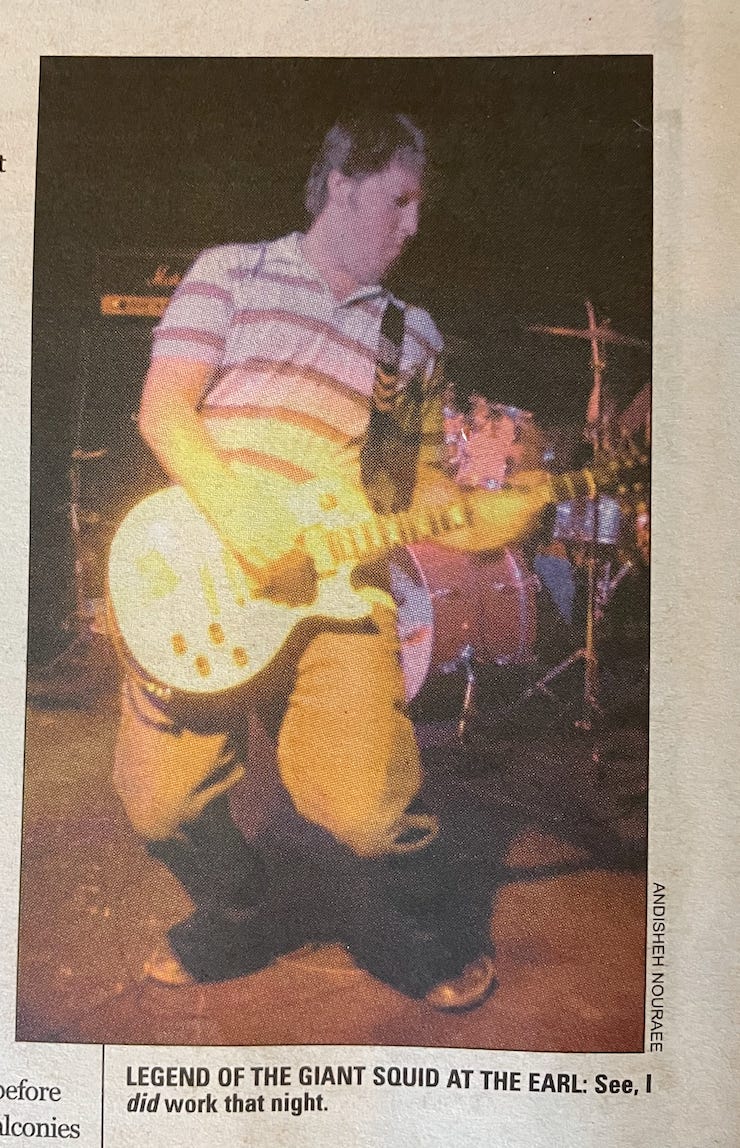
More vodka at Mary’s, quantity unknown:
There’s no photographic evidence of this, so I must have gone back to my car to drop off my camera. It was karaoke night and my friends Matt and Jen sang Toto’s “Africa.” I know that I sang the “I bless the rains” part along with them. If I grabbed the mic from one of them to do it, I apologize.
Other than Shermaning 25 percent of my brain cells, I’m now not sure what any of this had to do with the Civil War.
Many years later I ran into R. Land at Publix on Ponce. Next to the check out lanes he asked me how parenthood changes creativity. I think I had diapers in my cart. I don’t remember what I said, but if he asked me today I’d say it makes me more creative (because my perspective has broadened) and less creative (because I have less energy to do stuff).
I haven’t asked him, but I wonder if Tom Branch would agree. He still plays music and has subsequently become a successful video producer.
I wonder who took this photo.
